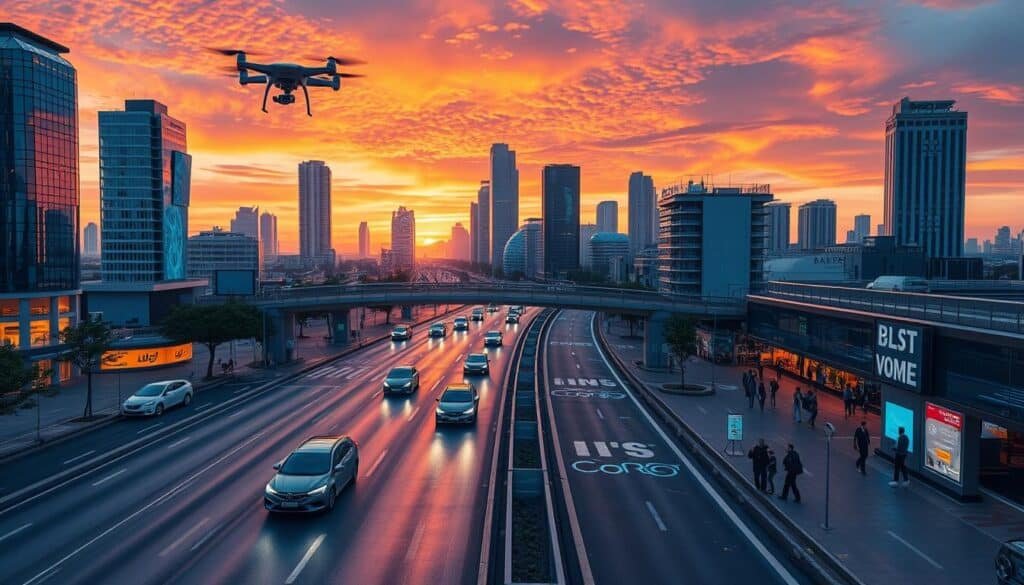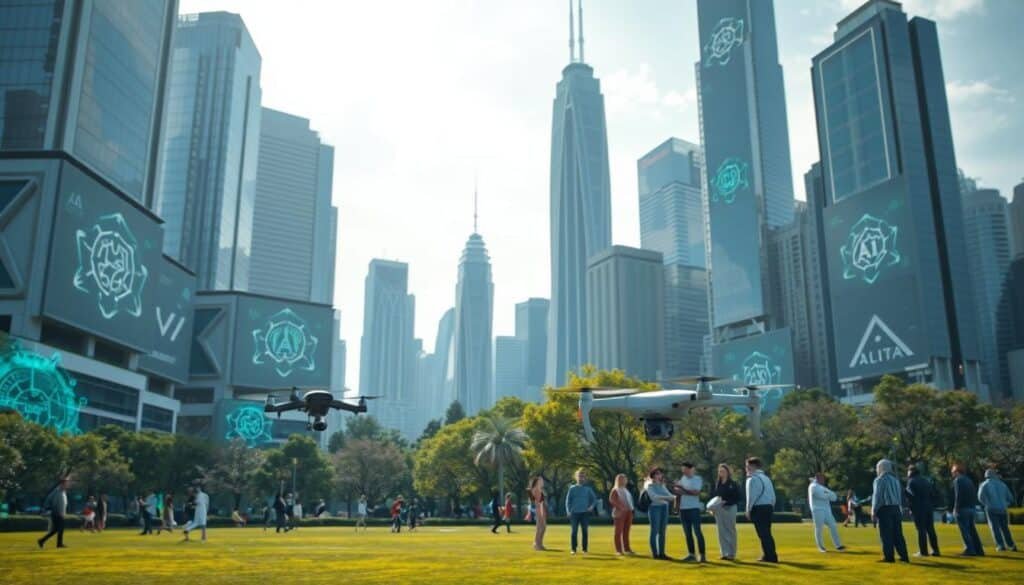Future Of AI has moved from science fiction to reality, changing our world. The Dartmouth Summer Research Project on Artificial Intelligence in 1956 started AI research. This led to big steps forward over the years.
IBM’s Deep Blue beating chess champion Gary Kasparov in 1997 showed AI’s power. It could do things better than humans in certain areas.
Now, AI like ChatGPT is making waves, showing its power to change industries. Looking ahead, AI’s future looks bright. It will bring new tech and change how we live and work.
Key Takeaways
- Over 60 countries have developed national AI strategies, indicating substantial investments in AI research and development.
- AI is projected to add $4.4 trillion to the global economy through continued exploration and optimization.
- Automation and optimization through AI models like GPT-4 offer the potential for cost-effectiveness and efficiency.
- The development of smaller AI models highlights a trend towards affordability and accessibility in AI technologies.
- AI’s broad applications across multiple industries reflect its influence on core technologies like computer vision and natural language processing.
Understanding AI’s Evolution and Current State
The history of artificial intelligence (AI) is fascinating. It has moved from science fiction to a real force in our lives. Alan Turing’s work in the 1930s and 1950s was key. It laid the groundwork for AI and modern computer science.
From Science Fiction to Reality
In the 1950s, “artificial intelligence” was first used by John McCarthy. He also created the LISP programming language. Back then, researchers aimed to make systems that could reason and solve problems using logic.
But, by the 1980s, funding for AI dropped. This was due to high hopes that weren’t met. It was called the “AI Winter.”
Key Milestones in AI Development
The late 20th century saw a comeback in AI. This was thanks to machine learning and neural networks. The 1990s brought powerful computers and lots of data, speeding up AI’s growth.
Neural network research led to big advances. We saw the rise of multi-layer perceptrons, CNNs, and RNNs.
Present-Day AI Applications
AI is everywhere today. It helps with web searches, ads, spam filtering, and understanding language. It’s also in self-driving cars, recognizing images, and helping in healthcare.
Recently, AI like DeepMind’s AlphaFold has shown its power. It can solve complex biological problems better than humans in some areas.
| Sector | AI Applications |
|---|---|
| Finance | Fraud detection, portfolio management, credit and loan evaluation |
| Manufacturing | Optimized production processes, reduced waste, increased efficiency |
| Transportation | Autonomous vehicles, AI-powered traffic management |
| Agriculture | Precision techniques, pest and disease identification, optimized planting |
As AI grows, we must think about its ethics. We need to talk about privacy, security, transparency, and bias. Working together, we can make sure AI helps us, not replaces us.
The Impact of AI on Society and Daily Life

Artificial Intelligence (AI) is changing many parts of our lives. It’s used in customer service, healthcare, and education. AI makes things more efficient, personalized, and helps us make better decisions.
In customer service, AI chatbots and virtual assistants are everywhere. They offer help anytime and tailor experiences for each person. AI integration in making things has made processes faster and more accurate. It also makes driving safer and traffic flow better.
Healthcare has seen big improvements with AI. AI can look at medical images and make accurate diagnoses. This helps doctors treat patients better. AI also makes learning in schools more fun and effective for students.
| Industry | AI Impact |
|---|---|
| Customer Service | AI-powered chatbots and virtual assistants provide personalized experiences and 24/7 support |
| Manufacturing | Increased automation boosts productivity and reduces human error |
| Transportation | Self-driving cars and intelligent traffic management systems enhance safety and efficiency |
| Healthcare | AI algorithms personalize diagnoses and treatments, improving outcomes |
| Education | AI-driven personalized learning experiences enhance student engagement and outcomes |
AI is also creating new ways of doing business. It’s leading to the use of virtual assistants and robots. These changes are making customer experiences and decision-making better in many fields. As AI keeps getting better, it will have an even bigger impact on our lives and society.
Future Of AI: Major Transformations Ahead

The world is embracing artificial intelligence (AI) more and more. We can expect big changes and advancements in the future. AI will make things faster and more efficient in many areas, but we must also think about privacy and ethics.
Speed and Efficiency Gains
AI is changing how businesses work. A 2023 IBM survey found that 42 percent of big companies are already using AI. Another 40 percent are thinking about it. This means AI will soon be a big part of how companies make decisions and work.
Privacy and Ethical Considerations
As AI gets smarter, we need to worry about privacy and ethics. AI can collect a lot of personal data, which is a big concern. Governments are starting to make rules for AI, like the European Union’s AI Act in 2024.
Regulatory Landscape Changes
The rules for AI are getting more complex. Policymakers are trying to balance new technology with responsible use. The European Union’s AI Act could be a model for the world, shaping how AI is developed and used. Human-AI teaming will be crucial in managing societal fears and expectations regarding AI integration.
“AI could accelerate research in the biological sciences by as much as tenfold, potentially compressing 50 to 100 years of innovation into 5 to 10 years.”
| Impact of AI | Projected Changes |
|---|---|
| Education | The education system is predicted to experience a major transformation by 2028, making it barely recognizable. |
| Healthcare | AI is expected to lead to a significant increase in the rate of accurate medical diagnosis. |
| Finance | Banks and financial advisors will engage with clients more efficiently through natural language processing and machine learning. |
| Legal Services | The number of small and medium-sized law firms may decrease as AI systems can perform work that previously required more human lawyers. |
Industries Facing AI Revolution

Artificial intelligence (AI) is changing many industries. It brings new ways to work, innovate, and disrupt old methods. AI is making healthcare, finance, education, and transportation better and more efficient.
In healthcare, AI helps doctors make better diagnoses and treatments. It looks at medical scans and finds patterns to spot diseases early. AI also makes healthcare more accessible with chatbots and remote monitoring.
The finance world is using AI for fraud detection, risk management, and customer service. AI looks at lots of data to make smart decisions. This helps banks and financial companies work better and serve customers better.
In education, AI changes how students learn and teachers teach. It creates learning plans that fit each student’s needs. AI also helps teachers by grading and giving feedback, so they can focus on teaching.
The transportation sector is also seeing big changes thanks to AI. AI is making cars drive themselves, improving logistics, and cutting down on pollution. It’s making travel safer and more efficient.
| Industry | AI Applications | Key Benefits |
|---|---|---|
| Healthcare |
|
|
| Finance |
|
|
| Education |
|
|
| Transportation |
|
|
AI is changing the world fast. Companies that use AI will be ahead of the game. They will innovate, work better, and make customers happier in many areas.
Also Read: Where To Learn Coding Online?
Human-AI Collaboration and Workforce Evolution
AI technologies are changing the job market in big ways. While AI might affect about 40% of jobs worldwide, it’s also creating new roles. Jobs that need creativity, social skills, and complex management might stay the same. But, new jobs like AI specialists and robotics engineers are popping up.
New Job Creation and Skills Development
The workforce needs to learn many new skills. These include STEM, computer programming, and critical thinking. Reskilling and upskilling are key to keeping jobs and creating new ones. The World Economic Forum says 97 million new jobs could appear by 2025, thanks to AI.
Workplace Integration Strategies
AI is becoming a big part of many industries. Companies need to find ways to use AI well in their work. They should offer training to help employees learn to work with AI.
This teamwork between humans and AI can lead to more innovation and better decisions. It’s a key part of the future of work.
Training and Adaptation Requirements
Staying up-to-date with AI is crucial for both people and companies. Businesses should invest in training that helps employees work with AI. This mix of human creativity and AI’s power will shape the future of work.
FAQs
Q: What is the future of artificial intelligence in the next decade?
A: The future of artificial intelligence is expected to be transformative, with advancements in machine learning, deep learning, and generative AI tools that will revolutionize various industries. AI will impact the future by enhancing automation, improving decision-making, and creating new business opportunities.
Q: How will AI tools impact the job market?
A: AI tools are poised to change the job market significantly. While some jobs may be lost due to automation, new roles will emerge that require AI skills and knowledge. Industries will have to adapt by training human workers to work alongside advanced artificial intelligence systems.
Q: What types of AI are expected to emerge in the next 10 years?
A: In the next decade, we can expect the growth of various types of AI, including narrow AI, general AI, and advanced AI systems. These developments will allow for more complex applications, such as enhanced facial recognition and AI-enabled business intelligence solutions.
Q: How will machine learning influence the future of artificial intelligence?
A: Machine learning will continue to be a driving force in the evolution of AI. By leveraging massive amounts of data, machine learning algorithms can improve their accuracy and efficiency, leading to more powerful AI applications across different sectors.
Q: What are the potential impacts of AI on the healthcare industry?
A: The impact of AI on the healthcare industry is expected to be profound. AI can assist in data collection, improve diagnostic accuracy, and enable personalized treatment plans. Generative AI tools can also facilitate drug discovery and patient monitoring, ultimately enhancing patient care.
Q: How will AI change the way businesses operate?
A: AI will change the way businesses operate by streamlining processes, improving customer service, and providing insights through data analysis. The use of AI will enable companies to make data-driven decisions and innovate more rapidly, changing the future of business strategies.
Q: What role will big data play in the future of artificial intelligence?
A: Big data will play a crucial role in the growth of AI by providing the necessary amounts of data for training AI models. The ability to analyze and interpret large datasets will enhance AI’s capabilities, leading to more effective and intelligent systems.
Q: How is generative AI expected to evolve in the next decade?
A: Generative AI is expected to evolve significantly, with more sophisticated models emerging that can create realistic content across various media. This advancement will impact industries like entertainment, marketing, and design, allowing for innovative applications and creative solutions.
Q: What are the ethical considerations surrounding the impact of AI?
A: The impact of AI poses several ethical considerations, including issues related to responsible AI usage, data privacy, and potential bias in AI systems. It is essential for AI companies to prioritize ethical practices to ensure that AI is used responsibly and equitably in every industry.
Source Links
- https://www.ibm.com/think/insights/artificial-intelligence-future
- https://pg-p.ctme.caltech.edu/blog/ai-ml/the-future-of-ai-a-comprehensive-guide
- https://www.simplilearn.com/future-of-artificial-intelligence-article
- https://kaizen.com/insights/evolution-ai-origins-future/
- https://bernardmarr.com/the-evolution-of-ai-transforming-the-world-one-algorithm-at-a-time/
- https://www.3dbear.io/blog/the-impact-of-ai-how-artificial-intelligence-is-transforming-society
- https://bernardmarr.com/what-is-the-impact-of-artificial-intelligence-ai-on-society/
- https://www.forbes.com/sites/kalinabryant/2023/12/13/how-ai-is-impacting-society-and-shaping-the-future/
- https://www.techtarget.com/searchenterpriseai/tip/The-future-of-AI-What-to-expect-in-the-next-5-years
- https://builtin.com/artificial-intelligence/artificial-intelligence-future
- https://www.spiceworks.com/tech/artificial-intelligence/articles/industries-ai-will-disrupt/
- https://research-center.amundi.com/article/artificial-intelligence-revolution-sector-perspectives
- https://www.businessinsider.com/what-the-ai-revolution-means-for-business-2024-5
- https://smythos.com/artificial-intelligence/human-ai-collaboration/human-ai-collaboration-and-job-displacement/
- https://www.forbes.com/councils/forbestechcouncil/2023/05/04/the-future-of-the-workforce-how-human-ai-collaboration-will-redefine-the-industry/
- https://www.linkedin.com/pulse/future-work-how-human-ai-collaboration-transform-jobs-robinson-nmrtc





